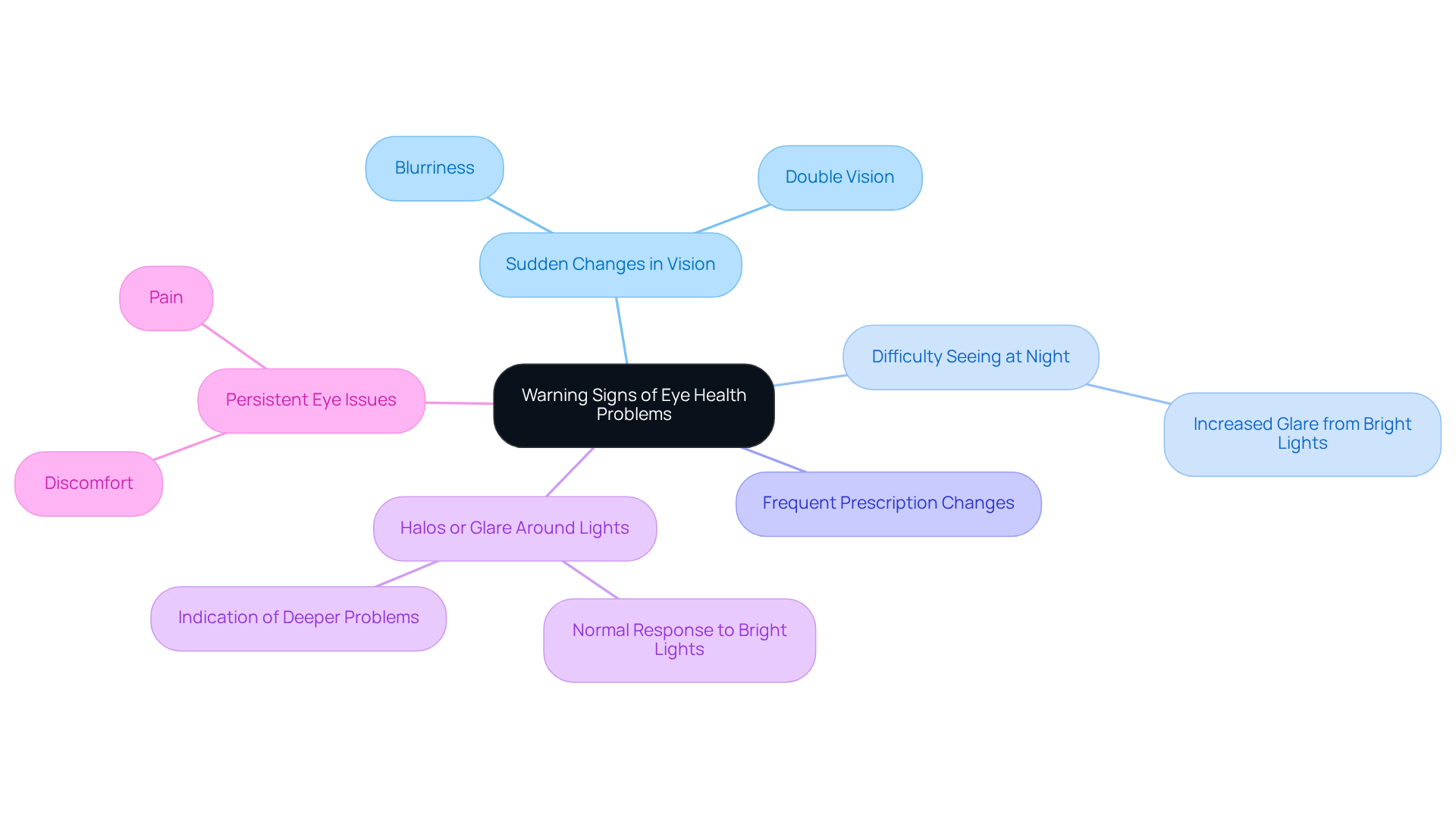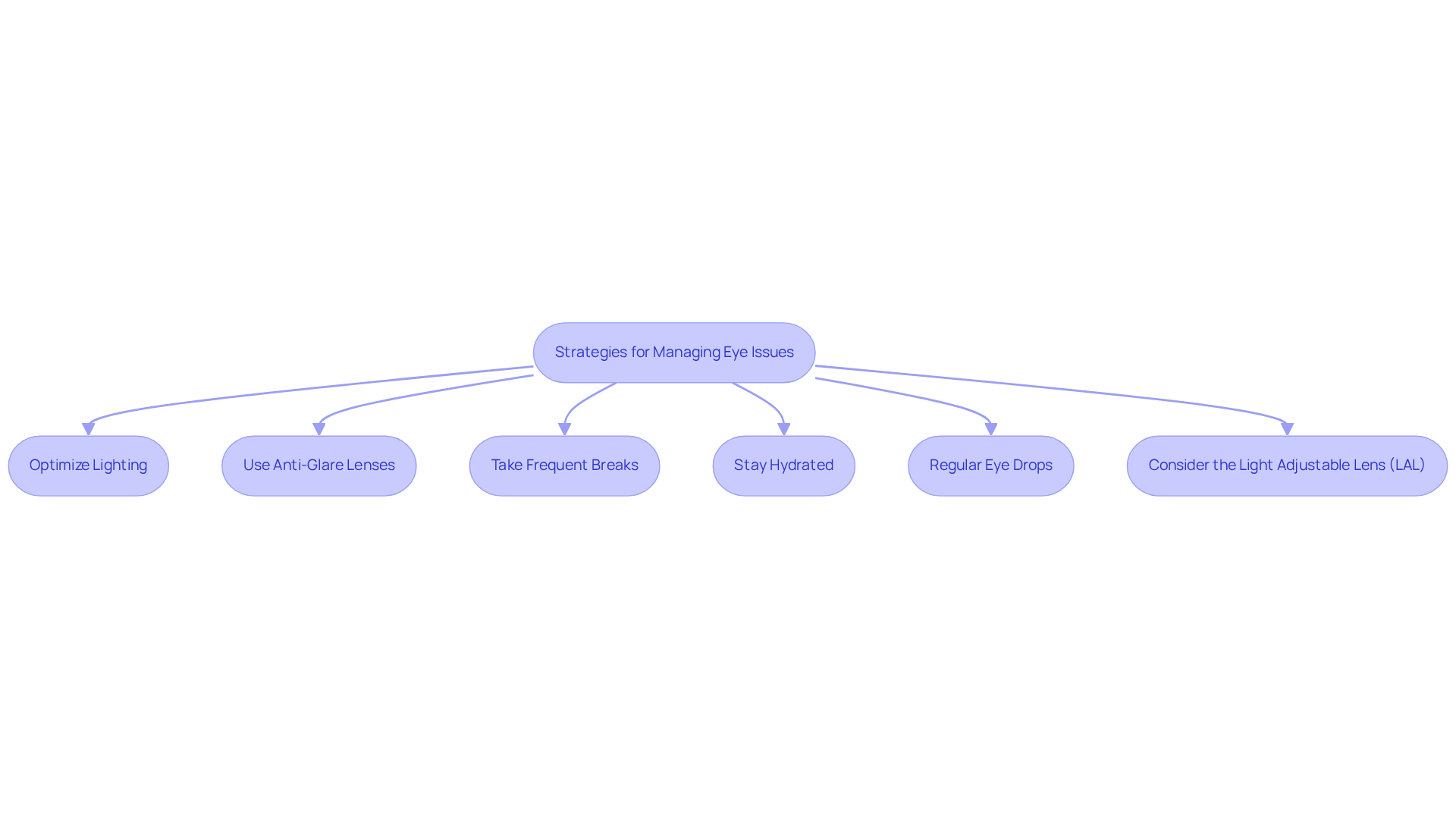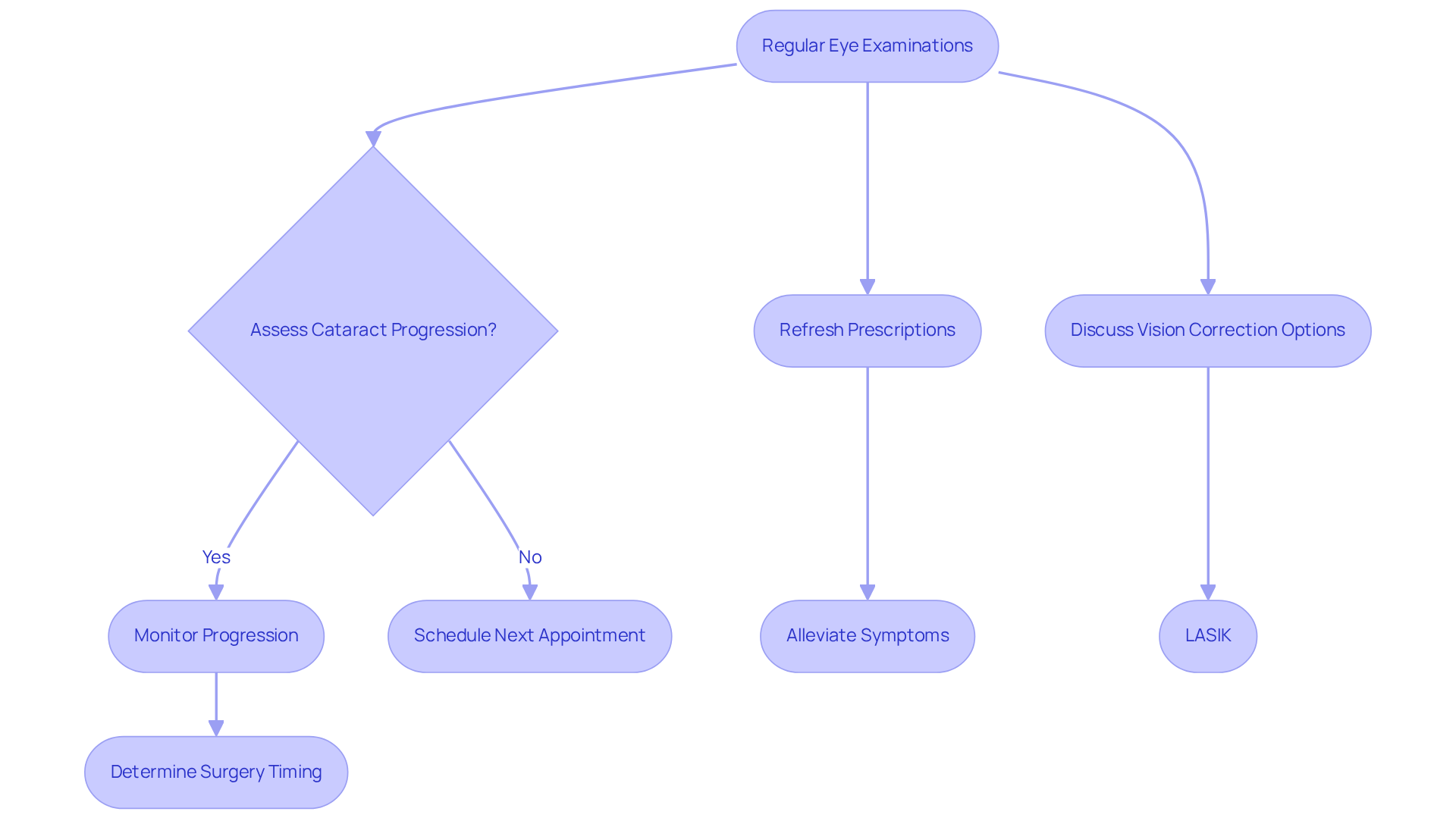Posted by: Northwest Eye in Cataract Surgery, Cataracts on September 6, 2025
Overview
We understand that managing cataracts can be a challenging experience. However, there are effective ways to enhance your daily visual comfort. By optimizing your lighting, utilizing anti-glare lenses, and scheduling regular eye examinations with your ophthalmologist, you can take proactive steps in managing your eye health.
It’s common to feel overwhelmed, but these strategies are vital in ensuring timely interventions, such as cataract surgery, when necessary. Regular check-ups not only help in monitoring your condition but also provide reassurance that you are taking care of your overall eye health.
Remember, we are here to help you through this process. Your comfort and well-being are our top priorities, and we encourage you to reach out for support as you navigate your journey with cataracts.
Introduction
As individuals age, the inevitability of vision changes can be daunting. We understand that facing conditions like cataracts, which cloud the lens of the eye, can bring about feelings of uncertainty and concern. It’s crucial to know how to effectively manage these changes to maintain your quality of life, whether it’s for reading, driving, or simply enjoying daily activities.
This article explores essential practices for cataract patients. We offer valuable insights into:
- Recognizing warning signs
- Implementing effective management strategies
- Emphasizing the importance of regular eye examinations
It’s common to feel overwhelmed, but navigating the complexities of cataract care is possible. Together, we can ensure optimal vision as you age.
Understand Age-Related Vision Changes
As individuals age, it’s common for them to experience various eye issues. You may find it harder to focus on near objects, feel increased sensitivity to glare, or notice a general decline in visual acuity. Cataracts, which cause clouding of the eye’s natural lens, are a frequent consequence of aging and can result in eye issues. We understand that these changes can significantly impact your daily activities, such as reading, driving, and recognizing faces. Recognizing these alterations can help you determine when it might be necessary to seek advice from an eye care expert regarding eye issues for further assessment and possible treatment options, including lens replacement surgery.
At Northwest Eye, we are committed to making eye care services, including lens surgeries, more accessible through various financing choices. Our flexible payment plans and potential insurance coverage ensure that financial concerns do not hinder your ability to receive the necessary care. Our eye surgeons provide personalized consultations to help you choose the most suitable lens options tailored to your lifestyle needs. With advanced technologies like the Light Adjustable Lens (LAL), you can enjoy customized vision correction after surgery, allowing for fine-tuning of your prescription to achieve optimal visual outcomes.
Many individuals initially manage cataracts by adjusting their lighting or using magnifying glasses. However, as the condition progresses, these adaptations may no longer be sufficient. It’s important to recognize the value of timely intervention. Regular conversations with your ophthalmologist can help you navigate these changes effectively, ensuring you stay informed about the latest developments in lens technologies and treatment options available at Northwest Eye. Remember, we are here to help you through this process.
Identify Warning Signs of Eye Health Problems
If you have cataracts, it’s important to pay close attention to any warning signs that may indicate a decline in your eye health, as this could signal potential eye issues. We understand that this can be concerning, and recognizing these symptoms can help you take the next steps toward care. Here are some key symptoms to watch for:
- Sudden changes in vision, such as blurriness or double vision, which may suggest underlying issues like cataracts or uncorrected refractive errors.
- Increased difficulty seeing at night or in low-light conditions, often made worse by glare from bright lights.
- Frequent changes in your prescription glasses or contact lenses may indicate potential eye issues that are affecting your vision.
- Halos or glare around lights, especially at night; while this can be a normal response to bright lights, it may also indicate deeper problems.
- Persistent eye issues can include discomfort or pain.
If you experience any of these symptoms of eye issues, please reach out to your eye care provider without delay. Early detection of complications can lead to more effective treatment options and better outcomes. For instance, if you notice sudden changes in your vision, it may be necessary to seek an urgent evaluation to determine if cataract surgery is needed or if other underlying issues are present. Remember, we are here to help you through this process.

Implement Strategies for Managing Common Eye Issues
Managing common eye issues associated with cataracts can feel overwhelming, but there are several strategies that can help you navigate this journey with greater ease:
-
Optimize Lighting: It’s important to ensure that your living spaces are well-lit. Using brighter bulbs and reducing glare with shades or curtains can significantly enhance visibility and minimize strain on your vision.
-
Use Anti-Glare Lenses: If you find bright lights challenging, consider wearing glasses with anti-reflective coatings. This can help reduce glare from headlights and other bright lights, especially when driving at night.
-
Take Frequent Breaks: For those who spend long hours reading or using screens, the 20-20-20 rule can be incredibly helpful. Remember to look at something 20 feet away for 20 seconds every 20 minutes to alleviate eye strain.
-
Stay Hydrated: Keeping yourself hydrated is essential for maintaining eye moisture and comfort, particularly if you experience dry eyes.
-
Regular Eye Drops: Using lubricating eye drops can provide relief from dryness and discomfort, especially in low humidity environments or during allergy seasons.
-
Consider the Light Adjustable Lens (LAL): If you are preparing for cataract surgery, the innovative Light Adjustable Lens offers a personalized approach to vision correction. Unlike traditional lenses, the LAL allows for adjustments post-surgery, enabling your doctor to tailor your vision to meet your lifestyle needs. This advanced technology uses a special material that responds to UV light, which can significantly enhance your quality of life after surgery.
By incorporating these strategies into your daily routine, you can manage your eye issues more effectively and maintain a better quality of life while awaiting surgical intervention. Remember, we are here to help you through this process, and it’s common to feel a range of emotions as you navigate your care.

Schedule Regular Eye Examinations and Consultations
If you have cataracts, it’s important to prioritize regular eye examinations with your ophthalmologist at Northwest Eye to monitor for any eye issues. We understand that navigating eye health and addressing eye issues can be overwhelming, but these appointments are crucial for your well-being.
- Monitoring Progression: Regular check-ups allow your eye care provider to assess how your cataracts are progressing. This helps determine the right timing for surgery, ensuring you receive timely intervention when needed.
- Refreshing Prescriptions: Eye examinations can confirm that you have the correct prescription for glasses or contact lenses. This can help alleviate some symptoms related to lens opacities, making your daily life a bit easier.
Comprehensive eye exams at Northwest Eye can also detect other eye issues, such as glaucoma or macular degeneration, which may require additional treatment. If you’re considering vision correction options, services like LASIK may also be discussed.
We encourage you to talk with your eye care provider about your individual needs to establish a personalized schedule for your examinations. For many, an annual visit may suffice, while others might need more frequent assessments based on their specific circumstances. By staying proactive about your eye health and utilizing the comprehensive services offered at Northwest Eye—including cataract care, LASIK, and glaucoma management—you can ensure you receive the best possible care and outcomes. Remember, we are here to help you through this process.

Conclusion
Recognizing and managing cataracts is essential for maintaining quality vision as we age. We understand that age-related vision changes can impact daily activities, and it’s important to address these concerns. By being proactive about eye health—seeking timely interventions and utilizing advanced treatment options—you can significantly enhance your visual outcomes and overall well-being.
Key strategies to consider include:
- Optimizing lighting
- Using anti-glare lenses
- Adhering to regular eye examinations to monitor the progression of cataracts
Additionally, innovative technologies like the Light Adjustable Lens offer personalized vision correction, showcasing the advancements available in cataract treatment. These practices not only help manage symptoms but also empower you to take control of your eye health.
We recognize that the journey through cataract management can feel daunting. However, it is vital to remain informed and engaged with your eye care professionals. By prioritizing regular check-ups and being attentive to warning signs, you can navigate your eye health more effectively. Embracing these best practices will lead to improved vision and a better quality of life, reinforcing the significance of proactive eye care in the face of age-related changes.
Frequently Asked Questions
What are common age-related vision changes?
Common age-related vision changes include difficulty focusing on near objects, increased sensitivity to glare, and a general decline in visual acuity. Cataracts, which cause clouding of the eye’s natural lens, are also frequent among the aging population.
How do age-related vision changes affect daily activities?
These changes can significantly impact daily activities such as reading, driving, and recognizing faces.
When should I seek advice from an eye care expert regarding vision changes?
It is advisable to seek advice from an eye care expert when you notice significant changes in your vision or when common adjustments, like changing lighting or using magnifying glasses, are no longer sufficient.
What services does Northwest Eye offer for age-related vision issues?
Northwest Eye offers various eye care services, including personalized consultations, lens replacement surgery, and advanced technologies like the Light Adjustable Lens (LAL) for customized vision correction.
How does Northwest Eye make eye care services more accessible?
Northwest Eye provides flexible payment plans and potential insurance coverage to ensure financial concerns do not hinder access to necessary eye care services.
What is the Light Adjustable Lens (LAL)?
The Light Adjustable Lens (LAL) is an advanced technology used in lens replacement surgery that allows for customized vision correction and fine-tuning of your prescription post-surgery for optimal visual outcomes.
What should I do if I notice my cataracts progressing?
If you notice your cataracts progressing, it’s important to have regular conversations with your ophthalmologist to stay informed about treatment options and the latest developments in lens technologies. Timely intervention can help manage the condition effectively.






